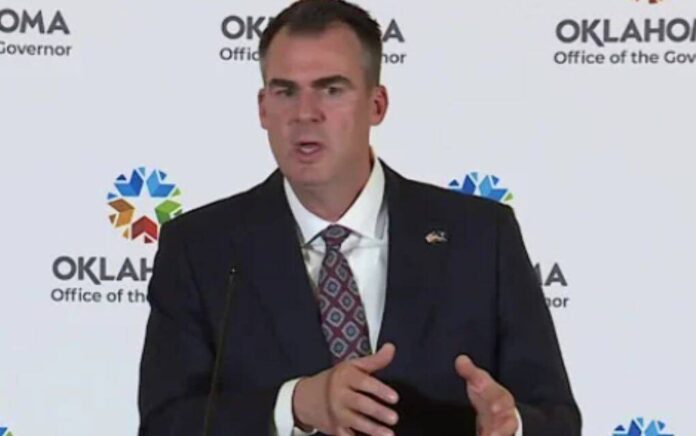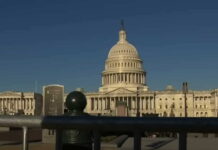
Usually the Democrat Party are the ones constantly stabbing U.S. citizens in the back. But not this time.
As this GOP Governor has turned his back on Americans by making this appalling proposal.
Oklahoma Governor Kevin Stitt has sparked controversy with his latest proposal to recruit low-wage migrants for local jobs that could otherwise support Oklahomans and their families. His call to action has raised concerns among residents who fear that the move would prioritize migrants over the state’s workers.
“I want to create opportunities to bring the best [foreign] talent to Oklahoma,” Gov. Stitt said in a post on X just before Labor Day weekend. His message followed recommendations from a state-funded task force urging the legislature to pass measures making it easier for employers to hire migrants: “We need the best nurses, the best engineers, the best accountants, the best construction workers & the best teachers. If they’re willing to come here and work hard, let’s match the employer with the employee. I hope the legislature will pursue the recommendations that reflect that intention.”
The state’s media coverage of Stitt’s proposal was largely favorable, with minimal criticism. However, voters reacted swiftly, with many expressing frustration and anger over what they saw as an effort to undercut local wages.
https://x.com/DissidentLaw/status/1829185816993681795
Business groups argue that migrants are necessary to fill workforce gaps, yet wage data reveals no signs of an actual labor shortage in Oklahoma. The Bureau of Labor Statistics reported that wage growth in the state remains stagnant, with only two counties seeing wage increases above the national average of 3.2 percent. In fact, average weekly wages in Oklahoma’s three largest counties fell below the national average in 2023, indicating that businesses aren’t competing by raising wages—a typical response to labor shortages in a healthy market.
Beyond wages, Oklahoma has also been grappling with rising drug-related deaths, an indicator of broader economic and social distress. Fentanyl overdoses surged from 50 in 2019 to 609 in 2022, highlighting the state’s deepening crisis.
With the economic landscape deteriorating, many argue that prioritizing migrant labor will only exacerbate existing problems rather than solve them.
While small numbers of migrants might not directly replace American workers, their presence lowers the incentive for businesses to invest in higher wages or productivity-enhancing technology. Migrants often accept long hours and lower wages, even in exploitative conditions, to support their families, creating an environment that disadvantages local workers.
As businesses are less pressured to modernize or pay competitive wages, Americans lose opportunities to thrive in their own economy.
Governor Stitt’s migration plan also stands to benefit Oklahoma’s larger cities more than its small towns, where many migrants prefer to settle. This influx could drive up housing costs in urban areas, further straining local resources.
Additionally, Stitt’s business interests raise questions about the underlying motives of his proposal. As the owner of a mortgage company, Stitt stands to benefit from a growing population of renters and homebuyers—both fueled by increased migration. His company faced criticism during his 2018 campaign, though no significant wrongdoings were found. Despite this, the conflict of interest remains notable.
The task force’s report outlines several recommendations, from expanding access to occupational licenses for non-citizens to increasing the use of visa programs like J-1 and H-1B to fill white-collar positions. These measures would significantly impact local workers, particularly recent graduates, by reducing their bargaining power and suppressing salaries across various industries.
Some business groups view these changes as essential, arguing that they would help Oklahoma keep pace with a globalized economy. The report also encourages lawmakers to issue driver’s licenses to migrants, which would enable them to access a broader range of jobs, particularly in sectors once dominated by American workers.
However, many critics see these measures as part of a broader national trend of eroding protections for American workers. A national immigration reform group condemned Stitt’s report, likening it to efforts to turn Oklahoma into a “sanctuary state” for migrants. Online, users voiced their frustration, accusing Stitt of prioritizing cheap labor over the welfare of Oklahoma’s residents.
The migration debate continues to polarize both Republicans and Democrats nationwide. As businesses push for more migrant workers to sustain profits, critics argue that migration policies harm the middle class, increase housing costs, and contribute to rising inequality.
Stitt’s proposal aligns with broader trends in U.S. immigration policy, as seen under President Biden’s administration. Since 2021, roughly 10 million migrants have entered the U.S., welcomed by businesses eager to capitalize on cheaper labor. This influx has been linked to stagnant wages, fewer opportunities for American workers, and growing social discontent.
Amid the backlash over his proposal, Governor Stitt has attempted to shift the narrative, focusing on potential tax cuts. However, the debate over his outsourcing plan and its implications for Oklahoma’s future remains unresolved, with residents deeply divided on the state’s economic and social trajectory.
Stay tuned to The Federalist Wire.



















